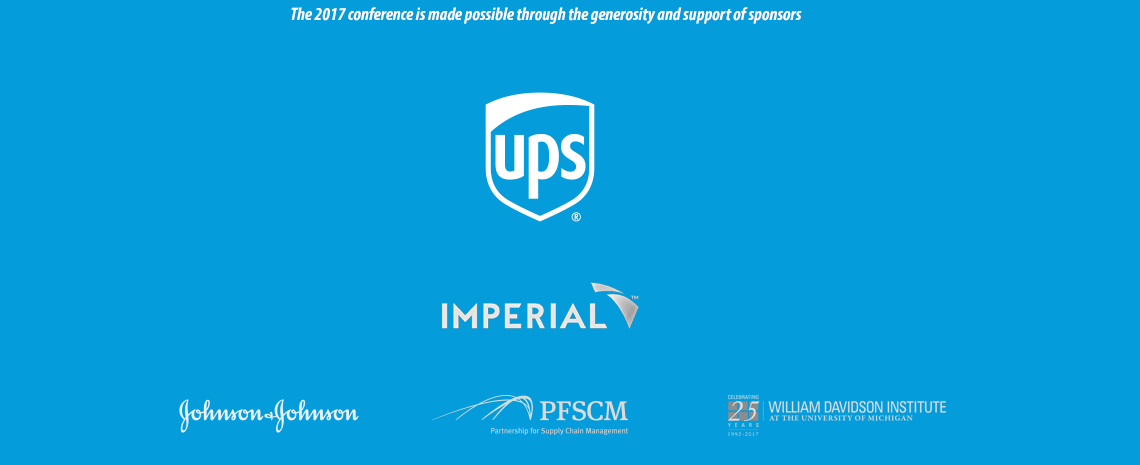Keynote and Panels
View available recordings of the conference keynote and panel sessions at YouTube.
Welcome Address
- Luk Van Wassenhove, Academic Director, INSEAD Humanitarian Research Group (Conference Co-Organizer)
- Conference Organizers
![]() Download a PDF version of the available slides
Download a PDF version of the available slides
Keynote
- Richard Brennan, Director of Emergency Operations, World Health Organization (WHO) Emergencies Program
![]() Download a PDF version of Dr. Brennan's Keynote
Download a PDF version of Dr. Brennan's Keynote
Other
- Jarrod Goentzel, Director of MIT Humanitarian Response Lab, Massachusetts Institute of Technology (MIT)
![]() Download a PDF version of Reflections on Day 1
Download a PDF version of Reflections on Day 1
Panel 1: Global Health Emergencies
The unprecedented scale and geographic spread of the 2014-2015 Ebola outbreak in West Africa demonstrated that nobody was prepared to respond to such an emergency. The recent outbreaks of Zika, cholera, yellow fever and others are reminders of the importance of preparedness and a well-coordinated response. These health emergencies have highlighted the critical importance of the supply chain preparedness continuum in outbreak response—from policy to point of care. From defining specifications, to prepositioning supplies, to identification of warehouses and establishing transport contracts—this panel will highlight steps that national governments, international institutions, and the private sector can take to strengthen preparedness for future health emergencies. Panelists will discuss the processes that their institutions have undertaken, as well as debate key challenges that remain. The session will give participants an opportunity to deepen their understanding of the range of preparedness measures that can contribute to a rapid, effective response.
- Vidhya Ganesh, Deputy Director for Programme Division, UNICEF (HQ NY) Moderator
- Jean-Christophe Aze, HQ Global Alert and Response Operations (GAR), World Health Organization (WHO)
- Paula Fernandes, Founder and CEO, Global Scientific Solutions for Health (GSS)
- James Walsh, Emergency Management Specialist, U.S. Centers for Disease Control & Prevention (CDC)
![]() Download a PDF version of available Panel 1 presentations
Download a PDF version of available Panel 1 presentations
Panel 2: Innovation & Influencing Markets
Globally, including in the humanitarian system, there is a proven ability to produce innovative ideas however the innovations are not reaching scale to the populations that need them the most. Challenges include knowledge gaps of the need, context and user suitability of innovations; funding (e.g for R&D); obtaining regulatory approvals; selecting appropriate pathways to scale which incentivize development; lack of advocacy of solutions to governments and implementing partners; stimulating a competitive supply base and ensuring a healthy market of accessible, affordable and appropriate products and more.
There is an ever growing role of the private sector in humanitarian development and collaboration in order to scale essential products for low-resource settings. The panel consists of actors with different roles in the innovation ecosystem who have experience with working with humanitarian innovation, ensuring commodities are accessible, affordable, and appropriate. The purpose of the panel discussion is to highlight the different aspects of ensuring innovations get scaled ranging from the innovator to the donor perspective. Their experiences in the field of humanitarian innovation will be discussed, focusing on the key ways to mitigate challenges for scaling solutions.
- Kristoffer Gandrup-Marino, Chief, Innovation Unit, UNICEF Supply Division Moderator
- Jim Coughlan, Director of Global Solutions, UPS
- Tor Inge Garvik, Product Development Manager, Laerdal Global Health
- Debra Kristensen, Director, Vaccine and Pharmaceutical Technologies, PATH
- Ingvild Von Krogh Strand, Senior Advisor, NOREPS / Innovation Norway
![]() Download a PDF version of available Panel 2 presentations
Download a PDF version of available Panel 2 presentations
Panel 3: Ensuring Sustainability of Supply Chain Systems Strengthening Interventions
While significant achievements have been made in strengthening public health supply chains and adopting a more strategic approach to planning and implementation, co-ordination of supply chain investments and measuring progress, there remain many cases where performance does not meet the expectations of these stakeholders and more importantly of the end users. Countries transitioning from donor support (often determined by macroeconomic indicators) are particularly vulnerable as resources are withdrawn without a sustainable transition plan.
This panel convenes public health Supply Chain Leaders and Practitioners to debate the issue of ownership and sustainability of supply chain interventions. Are Government and Partners factoring this critical element into development plans sufficiently? How do we move towards a world where Government is in the driving seat with a wide array of private, civil, and para-governmental partners? A world where national systems are the channel of choice, in the true spirit of the Paris Declaration, the Accra Action Agenda and subsequent supporting declarations, and the SDGs.
- Ken Legins, Chief of Supply Chain Strengthening, UNICEF Supply Division Moderator
- Moses Kamabare, CEO, National Medical Stores, Uganda
- Musonda Kasonde, Capacity Development Manager, UNICEF Supply Division
- Feston Kaupa, CEO, Central Medical Stores Trust (CMST), Malawi
- Mustafa Mahmud, Director, Logistics and Health Commodities, National Primary Healthcare Development Agency, Nigeria
About the Conference Series
The Health & Humanitarian Conference series is organized each year by the Center for Health & Humanitarian Systems (CHHS) at Georgia Tech in partnership with INSEAD, MIT, and Northeastern University, with generous support from corporate and other organizational sponsors.
Stay Connected on:
Contact
- humlogconf (@) gatech.edu
- 755 Ferst Drive, Atlanta, GA 30332






